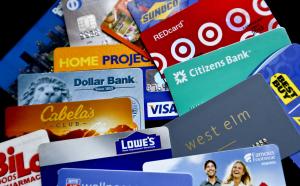Here's how the pandemic is changing summer wedding plans
Couples that were planning to marry in 2020 have had to contend with a unique type of wedding planning stress.
The coronavirus has derailed plans and forced couples to reimagine their big celebrations. But engaged couples and newlyweds have shown that COVID-19 is no match for love and they are finding creative ways to wed under the constraints of the pandemic.
Scaling down in-person events, bisecting wedding ceremonies from receptions, and incorporating video conferencing so the occasion can be digitally shared to those far and wide are some of the emerging trends from the wedding industry.
Cashay editor Janna Herron sat down with Yahoo Money and Cashay reporter Stephanie Asymkos to discuss the trends and outlook in the latest episode of the Money, Honestly podcast. Their conversation is based on Stephanie’s Yahoo Money and Cashay reporting.
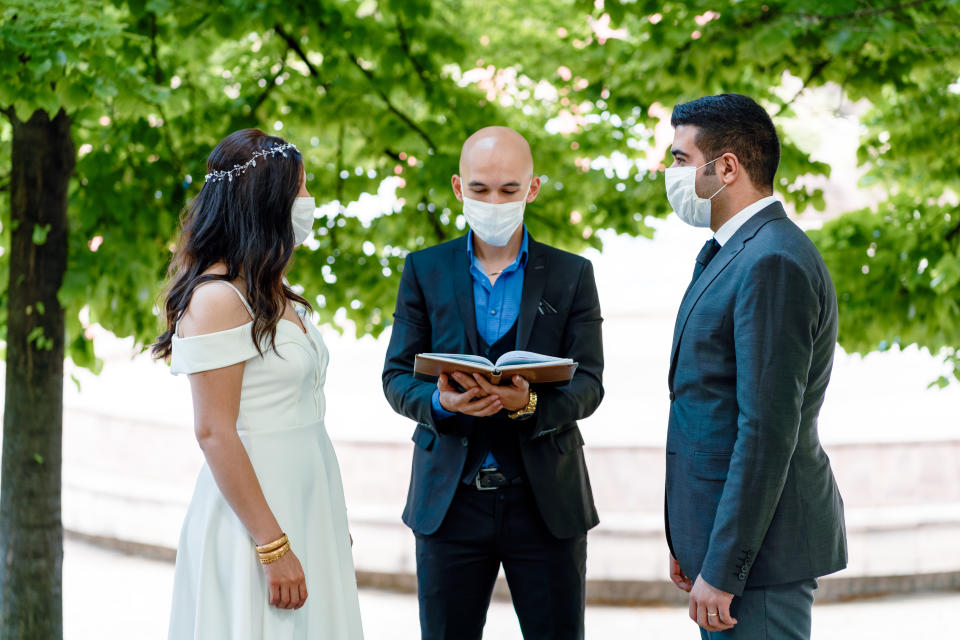
[AUDIO TRANSCRIPT]
Janna Herron: Hi, this is Money, Honestly. I'm Janna Herron and today we have Stephanie Asymkos, a reporter on my team at Yahoo Finance and Cashay, joining us. We'll be talking about weddings during the coronavirus pandemic. Stephanie, thank you for joining us.
Stephanie Asymkos: Hi Janna.
Janna Herron: So really love your articles. You have two actually, one for Cashay and one for Yahoo Money about weddings. I really wanted to get into this because we're in the middle of the summer, traditionally, this is the time when people are going to weddings or in weddings or having their wedding. So what is happening to the wedding season, now that we have this pandemic going on?
SA: Well, since the start of this pandemic, the wedding season, or the wedding industry rather, it's really been brought to its knees because, at the beginning of the pandemic, which arrived in the country in March, a lot of the people who were supposed to get married in the spring didn't, out of this abundance of caution, they decided to postpone, but not cancel their weddings. And now all of the summer couples, a majority of them are just saying like, "We're doing it." So 76% of summer weddings are still happening in one way or another.
JH: Wow. That's really surprising considering all that's happened, I would think it would be a little bit lower than that. So what are some of the reasons why people are still going through with those weddings?
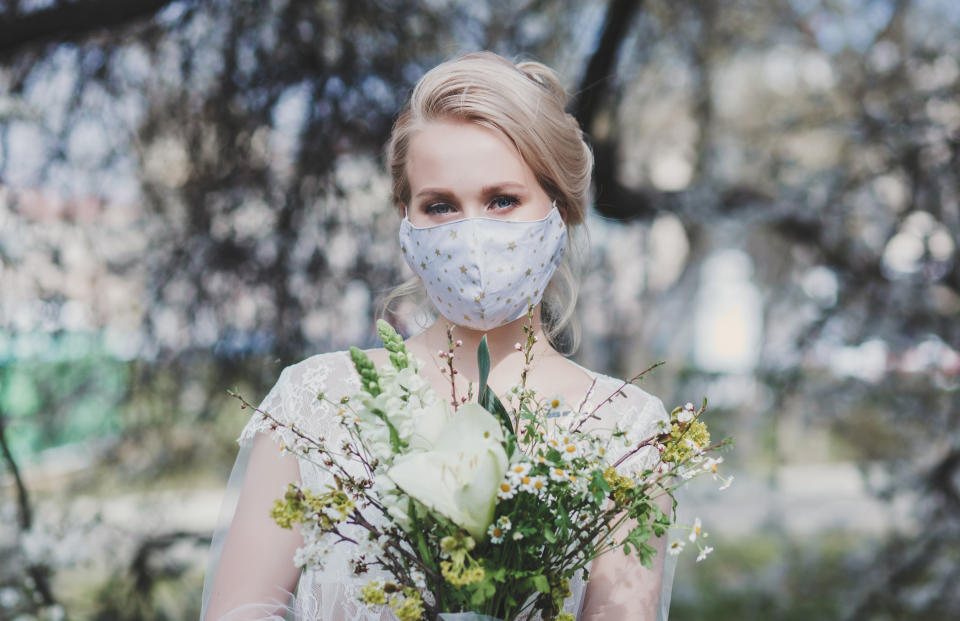
SA: That's interesting. I actually got to talk to an event planner, Christina Baruch, who's the owner of Events Made Golden. And she works primarily in New Jersey, but does service the Tri-state. And what she told me is that, people are two things really, people are optimistic, that by the time third wedding comes around for the summer and it's July when we're recording this. So really July and August, these next six weeks, they really think that wherever they're supposed to get married, things are going to change and restrictions are going to relax in some places.
Then other people think of this as a tactical reason of like, "We have to do this now, because we don't know if another lockdown like we saw in April, May, we don't know if that's going to come back." So they're just trying to get it done and get it accomplished. And that's the part they said earlier, is that, these weddings are still happening in one way or another. So they might look different. They might not be the big affair and a lot of people are just scaling it down.
JH: Can you talk a little bit more about that? What does it mean to scale it down? What kinds of things are they going about that?
SA: It's kind of romantic, it's romantic for me to say, because my wedding wasn't affected. I'm sure I would have a completely different tune if this were me, but people are really getting back to basics and having really scaled-down versions of weddings. People are getting married in parks and backyards.
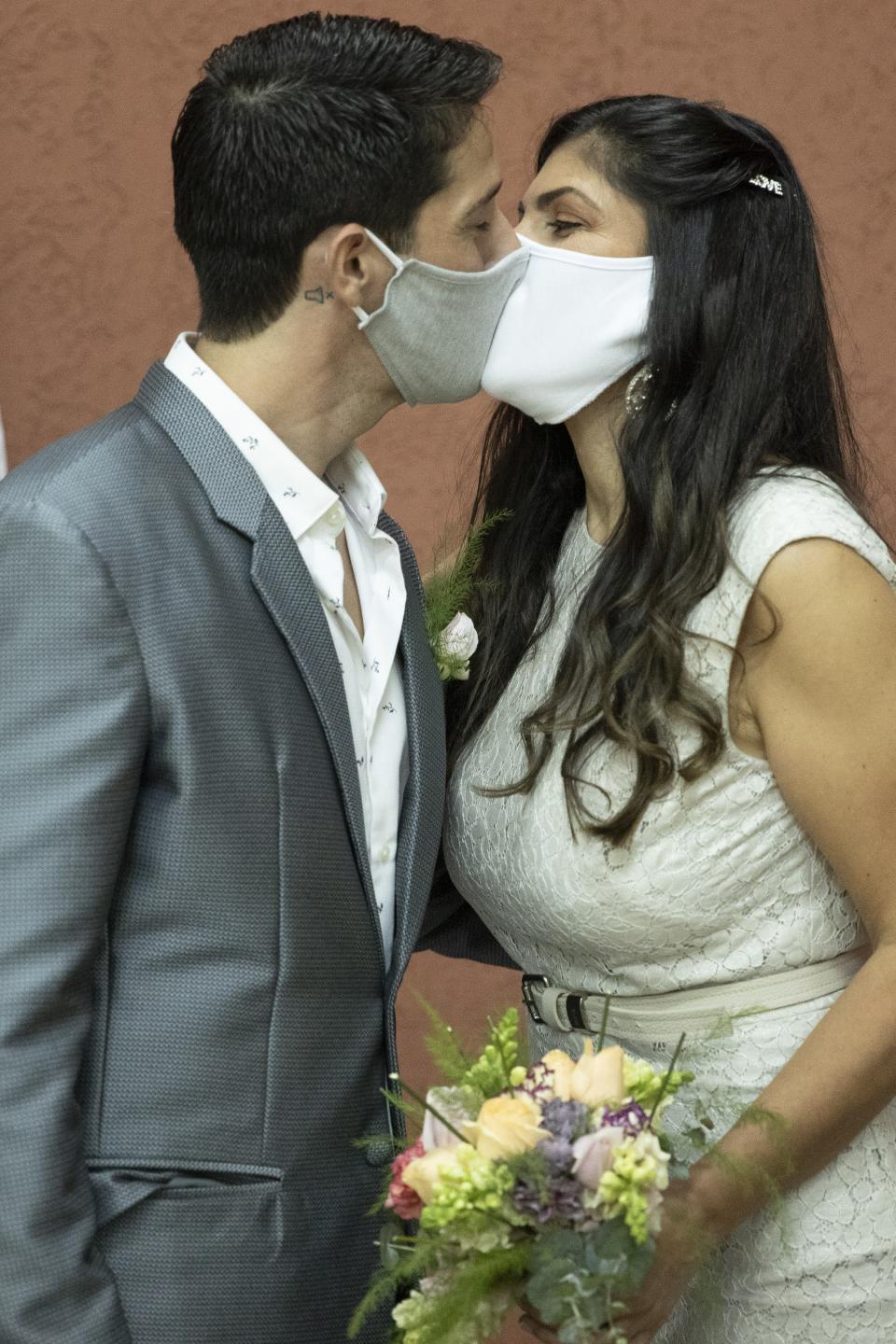
They're having friends go online and become officiants, so people can actually have these legal, above-board marriages and they're inviting 50 people or whatever that threshold is for the state that they live in and that's what they're doing. Some people are opting to live stream it on Zoom or Skype or whatever, but that's really what's happening now. And then 12 months from now, people are going to maybe potentially, think about doing vow renewal parties or first anniversary parties or a larger reception and that was another piece of my conversation that I have with Christina, the event planner.
JH: Okay. So they're going to do two different ceremonies? They have the actual ceremony and smaller reception, be able to celebrate still, but in a COVID kosher way.
SA: Yeah.
JH: But then they're planning down the road, a bigger celebration, so they're not letting go of that piece of it?
SA: Right. I'm thinking of it as a wedding in two acts. The first act is the marriage, that is the ceremony, the vows and then the second act, that's the reception, that's the party.
JH: Right. I saw in your article that you talked about, that some couples actually have to uninvite guests so they can make their large gathering smaller. Can you talk a little bit about that?
SA: In my reporting, I learned that the average wedding guests list in the US is 176 people, which I thought was kind of high, but that's the average, we can go a lot higher than that, or a lot lower, but 11% of couples are uninviting guests. And credit to them, that they are adhering to the CDC guidelines and recommendations for how many people should be gathered and then still remain six feet apart and social distance.
And then another thing about weddings, is that the modern wedding, people come in from far and wide. Commercial travel, it wasn't what it was 50 years ago or 100 years ago when people were getting married. So it's not uncommon for people to have to take planes or trains or buses to get to weddings. So people are really kind of nervous about traveling also. Sometimes wedding guests can self-select out of a wedding, and you could just communicate that graciously to the couple or the couple can uninvite people and say, "We're drawing a hard line on our family or our closest friends." And that's something that a wedding guest would have to understand. There really shouldn't be any hard feelings at this point, in what's going on right now in the world.
JH: And some guests, like you said, might actually be relieved because they didn't want to have to travel if that was what was expected or needed to do. Who wants to get on a plane these days.
SA: Exactly.
JH: Some people do, but not me.
SA: And even if you could drive, and if you have a car, some people are really reticent about staying in a hotel or an Airbnb. So it's not really a vacation for anyone or an extended, fun, long holiday weekend for anyone.
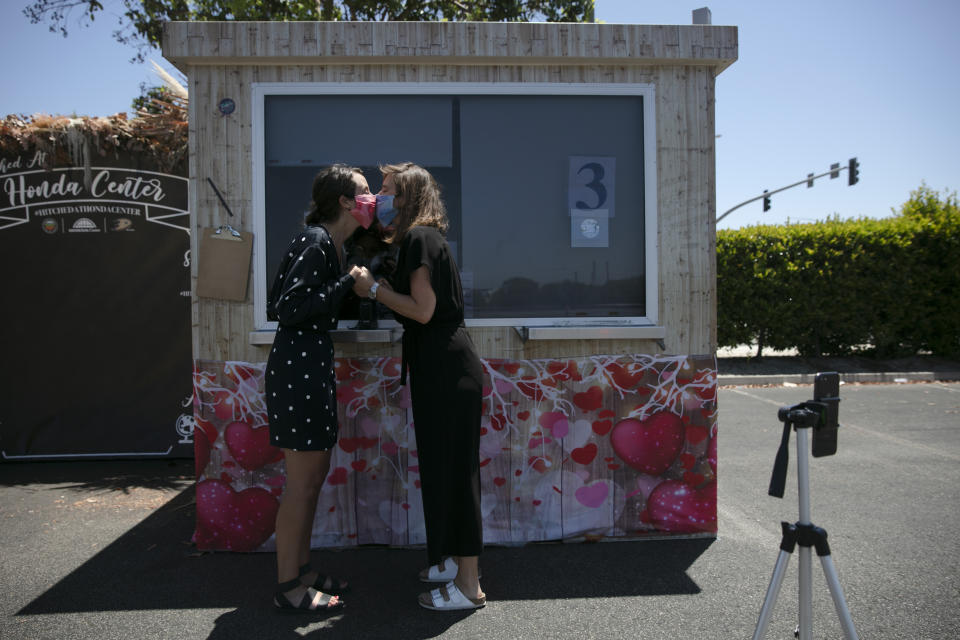
JH: So one of the couples that you talked to and who had that backyard wedding, they even had some things that really, you knew that it was a COVID-19 wedding in the sense that they had custom face masks. Right?
SA: I did. I talked about a couple who got married, not even a month ago and they were definitely in the honeymoon stage or whatever. They were just adorable and finishing each other's sentences. It was precious. They were adorable. But I talked to Benjamin Romer and Melanie Middleton and they live in Upstate New York, near Albany.
They actually got married in Melanie's parent's backyard, which I thought was just so quaint and intimate. And they had about 50 people there, mostly family, mostly people who also live in that region of New York. And they had this very small, intimate gathering. And then of course, they made nods to COVID, Benjamin had a friend who has a silk-screening business and commissioned that person to make custom face masks for everyone.
JH: Wow.
SA: I thought this was so incredible. They have a friend who works at a liquor distillery and at the beginning of the pandemic, when a lot of distilleries were turning alcohol into hand sanitizer, that's what their friends distillery did. So they had little customized hand sanitizer bottles for all of their guests, which I thought was just such a novel touch, but also extremely practical and just one way to one way to have fun with it, really put the COVID stamp on it, of like, this is happening, but this is what we're doing about it.
JH: And it might be a good little reminder of all the weird stuff that happened, but yet the silver lining is, we got married.
SA: Exactly.
JH: That sounds so sweet. So you also were talking about how some couples are electing to do live stream or Zoom weddings. Can you talk a little bit more about that? What does that entail?
SA: I am so fascinated by this and I wish I could get invited to one because I'm just so interested in how these all go down. But I mentioned, I talked to Christina Baruch and she basically said that, "If you are hosting a Zoom wedding, just to follow your bliss and have fun with it." And the reason that these things are happening is that, what we talked about before is that, some of her clients are still really committed to getting legally married on that wedding day and then having a larger party at least a year out, just to be conservative, at least a year out.
I guess the why, that this is happening is, because people are just so, terrible pun right here, but people are really wedded to that date. And she was telling me that there's so much symbolism and significance around people's wedding dates, and it could be anniversaries or it could be a parent's anniversary or they met on the fifth and then got engaged on the fifth and now they want to get married on the fifth.
So there's so many things that happen and it's totally fine, couples can do whatever they want. But if you're hosting a Zoom wedding or if you're attending a Zoom wedding, there's really no etiquette. Emily Post doesn't really have an opinion about these things. We're all making it up.
JH: So if you were invited to a Zoom wedding, how would you show up? For example, we're in Zoom meetings all the time for work and you can have your avatar up and not have your video on, so nobody knows that you haven't showered that day. Is that how it works for weddings as well?
SA: Pretty much and for all that is holy, for a Zoom wedding, mute your line. That is the first thing that you should do is, mute your line. But if you do feel so inclined on your end, feel free to just pop some champagne or sparkling water, whatever it is to make it a little livelier, because those of us who are working remotely with office jobs, we're on Zoom all day long. So you're not exactly attending a professional meeting, so maybe having a little bubbly would make it a little bit more livelier on your end, just so it's not your run of the mill, Zoom meeting that you're having all day long.
JH: And what about gift-giving during COVID?
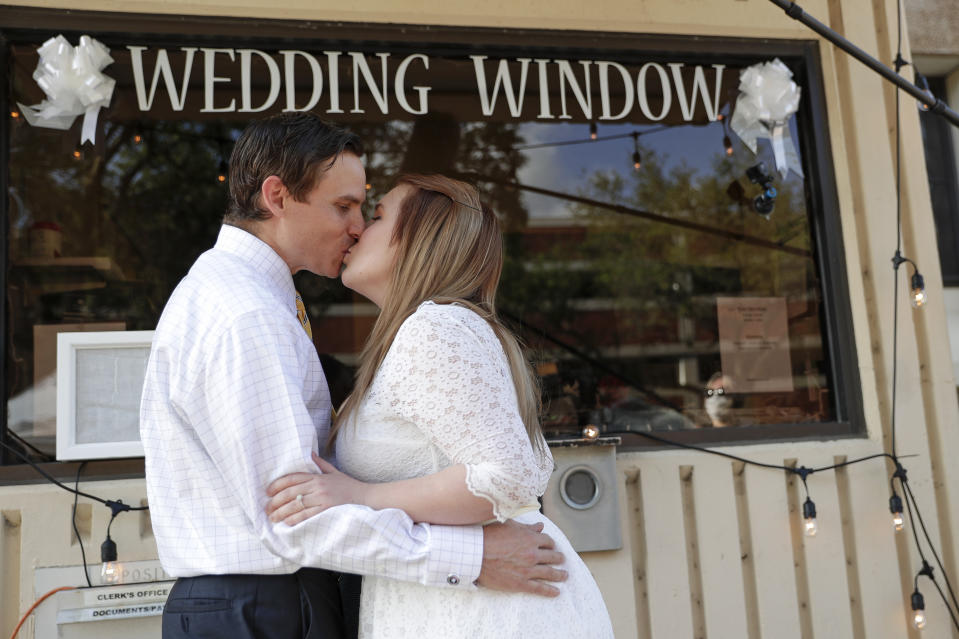
SA: Yeah, that's a really good question, because gift-giving is customary. You attend someone's wedding, you bring a gift or I think, you actually have 12 months to send someone a gift. But at any rate, if you're logging in for Zoom wedding, there is absolutely zero obligation or requirement on your part to send anything on that day. But if the couple is, you're really close to them, or if you're just a very generous person, it's totally nice to send a little basket of goodies or whatever, or if that's just not within your capabilities, a heartfelt card is really nice too.
That could be just a little handwritten note or an email saying that you're excited for the couple, kind of like the wishes that you would write if you attended their wedding live, you could write them in a card. And then, mention that COVID, and it's really weird what's happening right now, but you're still happy for them.
JH: What if you know that you might be invited to say, that next big celebration when things are back to normal in a year, do you do the gift then?
SA: Yes.
JH: Okay.
SA: You save your bigger gift for that first-anniversary party or that 12-month vow renewal or reception or whatever the couple wants to call it. Some parts of the country, some weddings, you buy off of the registry and that's what you do. And other parts of the country, it's just straight cash in an envelope. Whatever it is, you save that for a later date.
JH: And then why are some couples choosing to do the Zoom wedding instead of doing the scaled-down backyard wedding? What are the thoughts there?
SA: Well, you can still do a Zoom. You can still do a backyard wedding, but you can still stream it on Zoom.
JH: Okay. Yeah.
SA: Yeah. So you can do it both.
JH: Both worlds. Nice. Okay.
SA: Yeah. You can totally keep it closed-loop and only people there are people who are there live, no one else is off in the internet ether of watching you guys.
JH: And how long are these Zoom weddings? I mean, you're not there for the entire ceremony and then whatever reception. Right?
SA: I don't think so. I think that there is someone there probably if it is in a backyard or a park or in someone's living room, there is someone there with the phone or with the video equipment, who can live stream it, the ceremony, but then I'm not sure if anyone's probably just propping it up and leaving it on for the duration of the party. I'm not really sure. That's another thing to Christina's point, is there are no rules, do whatever you want.
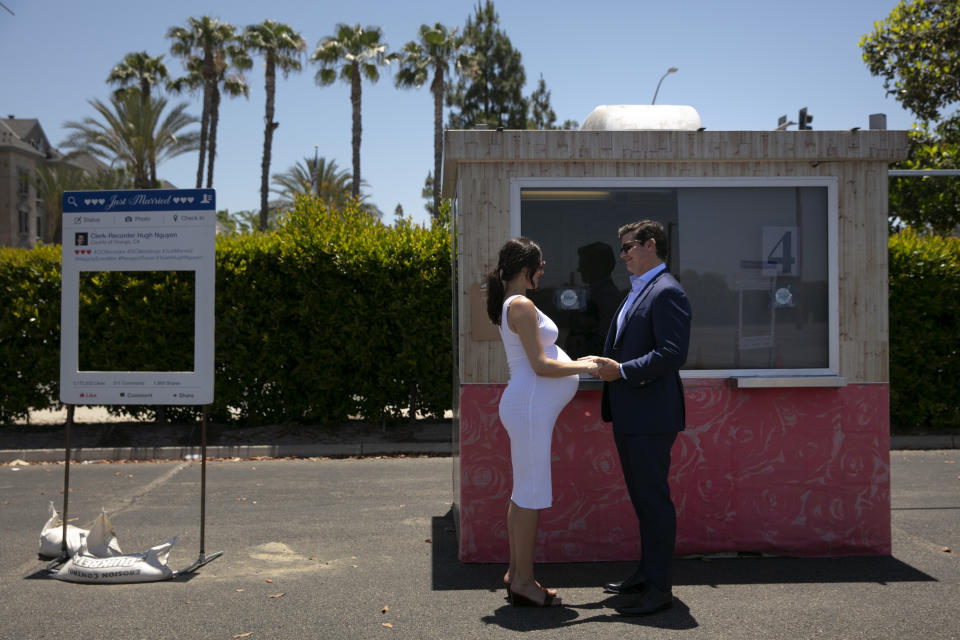
JH: Right. It would be kind of cool to see some of those traditional wedding things that you see, like the tossing of the bouquet or the cutting of the cake. Those things would be kind of cool to see.
SA: Yeah. And what's cool about this is that couples can elect to do that on their marriage ceremony date, or they can save it for that in-person reception, like TBD or they can do it again live, at that reception. So you can still have your first dance, but then at your reception at a later date and time, you can have your first dance, the sequel. Right? You can just do whatever you want.
JH: Right.
SA: So I know that might be really frustrating for some people who love rules and conventions and follow it to the letter. But right now, it's really open-ended, it's really up to your interpretation.
JH: So do you think this will have any long-term effects on how people do weddings going forward? Or do you think this is just a temporary thing that once the pandemic ends, we go back to the big weddings?
SA: Talking to Benjamin and Melanie, who we mentioned at the top, they had just the most wonderful things to say about their backyard wedding, which I should mention, was planned in a month. So there's really no need, they just disprove that idea that it's, "Oh, you need at least 12 months, 9 months to plan a wedding." They took care of it in a month. But they really had a lot of wonderful things to say and really spoke to the merit of a small, intimate wedding and really talked about the meaning of them professing their love for each other and their handwritten vows.
They even said, "If we were in front of our larger wedding." And their initial wedding that had to be canceled, it was for 225 people. So they said, "What we said to each other in front of 50 people, was not what we would have said in front of 225 people and that messaging really would have been lost or muddled in that larger audience." So they really loved how it all happened.
But then again, I talked to Christina who obviously, her livelihood is weddings and people planning big enough weddings that necessitate her as a professional wedding planner. So she thinks that weddings are going to go back to normal and then this is just a one time, COVID related anomaly in the wedding industry and that people are going to return to the 225 person affair and destination weddings and people flying in from far and wide and really making it big, and what we know now. But then again, she has an agenda, she's a wedding professional. So my opinion is somewhere in the middle of that, but really no one cares about what my opinion is.
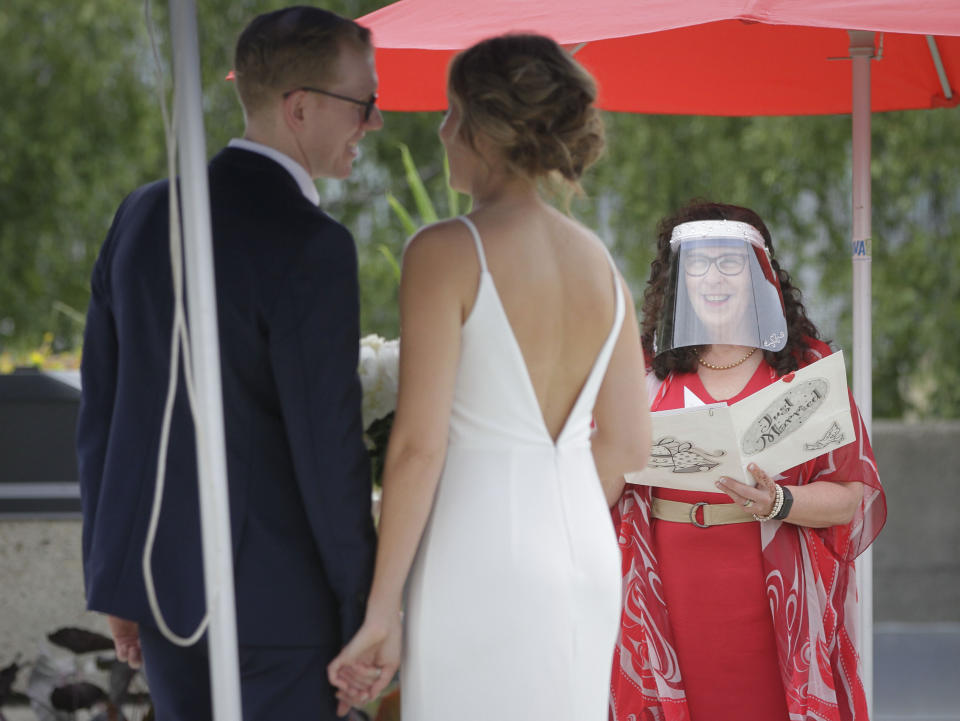
JH: So did Christina say anything about any couples that she has, who were planning, maybe getting married next year or the year after, if they are changing their plan?
SA: Yeah. Interestingly enough, people who are getting engaged now are planning for 2021, 2022 weddings, as business as usual. But what's happening now is, that a lot of the venues are having this bottleneck effect of dates, because we know that there's a finite amount of days in the year and in the wedding industry. There's really only four days of the week that people get married on, at least in this country, it's Thursday through Sunday and there's only so many Thursdays through Sundays.
JH: Right.
SA: So people who had their weddings derailed for 2020, are now looking at ‘21 and ‘22, and so are the recently engaged couples. So there's this jockeying for venues and for dates. So what might happen is that, who knows, maybe I'll be invited to a wedding and it'll be on a Wednesday in two years from now, who knows?
JH: Right. That's interesting.
SA: That might change a little bit, but to her point though, a backyard wedding, for as romantic and chic and not even COVID chic, I think it's just chic for chic sake. But she said, "It takes a lot of planning, there are so many moving parts." She gave me this one example about chairs. It's like you invite 50 people and 50 people all want to sit down. Where do you get 50 chairs and 50 of the same chair and 50 chairs that can be rained on?
And it's like, "Oh my gosh, you're right. Where does all of that come from?" So there are a lot of moving parts to plan it on your own. Whereas going through a wedding vendor and a wedding venue, they have all that equipment. They have the sound equipment, they have the chairs that all match. They have bathroom facilities for everyone. They have kitchens, that is what they do.
So I think people are just going to figure it out and it's a trend that I'll be watching closely. But Benjamin and Melanie have no regrets and they actually have a reception planned at the end of next month, at the end of August. I asked them, not like, "What are you going to do?" It's like they said, "This backyard wedding was a lot cheaper." And of course, what I mentioned before, about how much more intimate it was and they really loved that.
JH: So, I find the end of August would be optimistic for me at least, I think for a reception, given we're having ups and downs when it comes to the COVID.
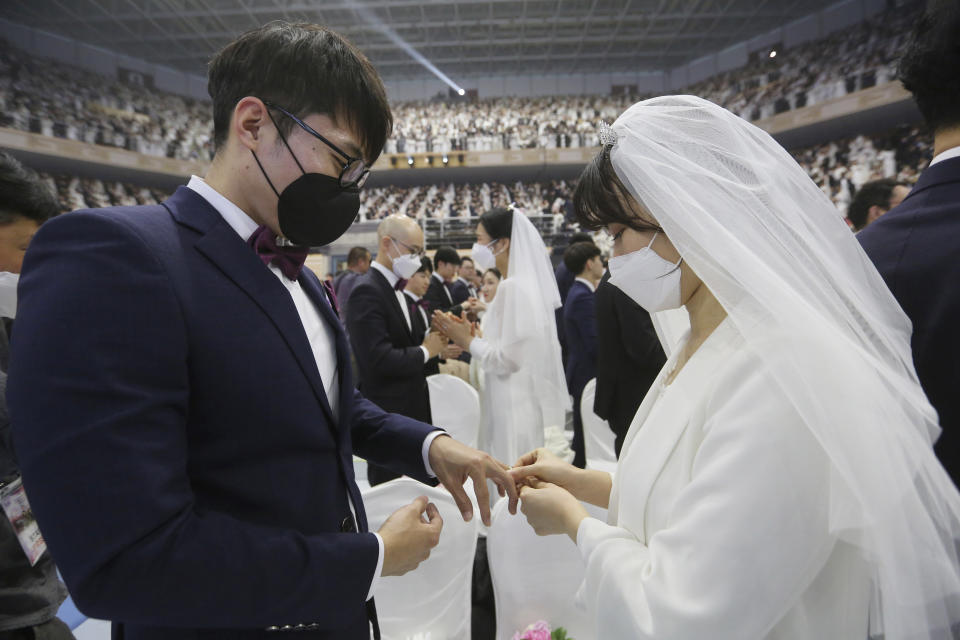
SA: Yes.
JH: But I'm glad that they had such a great experience with their wedding because I'm sure beforehand, that's not what they were thinking. And did Christina, the event planner, has she been helping couples revamp what they were going to do this summer?
SA: She told me all about her couples and her brides that she works with, that are re-engineering their days and what they look like. And then she's with them every step of the way of changing to a new date. She also says, her brides and grooms come to her and they think that she is this oracle, they're like, "What do you know now? How have the laws changed?"
And she's like, "I don't communicate with the governor. I don't know what you think." But there's an excited kind of desperation there. People are just so excited to get married and they're desperate for answers and they just really want their days to be perfect. And she said that some clients are, they're not happy about changing it, but the wedding date I mean, but they just really don't want a day where everyone's wearing masks and having to socially distance. So to them, moving it 12 months, 18 months out, whatever it is, is worth it for them.
JH: Whereas other people, they're more, as you said, married to the date.
SA: Yeah.
JH: No pun intended. So they are finding ways to be more flexible, which is what we all have had to do during this time. So it's not even just weddings, but it's work, it's school, but for weddings, it's definitely an emotional time already, add a pandemic, it's even worse.
SA: And planning a wedding is, it's a lot about the couple, but there are so many other stakeholders too, that have opinions, especially if those stakeholders are paying for the day also and then people have very strong opinions about it. So my heart goes out to these couples right now because it's tough. And every day there's new information and even if you want to throw something, say like, where we live in New York and someone's coming in from Ohio or something, it's like, "Well now, you have to self-quarantine for two weeks and now you can't come." There's just a lot of ever-changing information that comes out. So it's really tough.
JH: Well, thank you Stephanie, for joining us today on Money, Honestly. And thanks for everyone listening. Head over to Apple Podcasts and leave us a five-star rating and review. We'll see you next week.
Stephanie is a reporter for Yahoo Money and Cashay, a new personal finance website. She can be reached at stephanie.asymkos@yahoofinance.com. Follow her on Twitter @SJAsymkos.
Read more information and tips in our Family section





